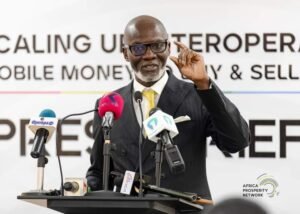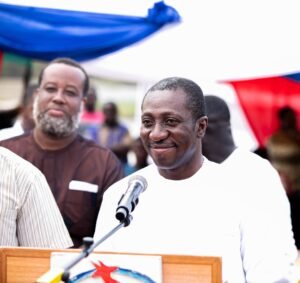
Lindywell Owusu Fodjour educates her colleagues on waste segregation
Solid waste management is a critical environmental issue for metropolitan, municipal and district assemblies (MMDAs), especially in the capital. Despite strenuous efforts by the authorities to deal with the issue, it remains a great hurdle to overcome.
In 2012, the World Bank estimated that poor sanitation was costing Ghana’s economy around GHC420 million, equivalent to 1.6 per cent of the country’s gross domestic product (GDP).
Accra’s problem is a global one because the higher a country’s income level and rate of urbanisation, the greater the amount of solid waste produced.
However, in fulfilling President Nana Akufo-Addo’s vision of making Accra the cleanest city in West Africa and the continent at large, Jekora Ventures Limited, in collaboration with the Accra Metropolitan Assembly (AMA), has taken steps to educate pupils in basic schools in the Korle Klottey municipality about waste segregation.
The move is aimed at changing the mentality of the pupils with regards to waste management and make them ambassadors of waste in their respective communities.
Re-training
Speaking to the Daily Statesman after a re-training session on waste segregation in some schools at Adabraka, the innovation manager at Jekora, Martha Annan, said that the idea of training pupils in the basic schools on how to handle their waste resource began in 2017 with a system to monitor the quality of segregation.
However, subsequent assessment conducted by the waste management company on the performance of the schools revealed that the quality of segregation had reduced, hence the need for the three-week re-training programme to improve the quality of segregation and to sustain the interest of the pupils.
Mrs Annan attributed the low performance to the influx of newly admitted pupils during the 2018/2019 academic year, the re-assignment of teachers and supervisors, among other things.
Commitment
According to the innovation manager, her outfit intends to sustain the initiative following the success at the pilot stage of the progamme with over 10,000 trainees.
“We felt that if every year we are able to get to 10,000 kids, it means we can make a significant impact on the nation,” she said.
She indicated that, as part of the corporate social responsibility of Jekora Ventures Limited, an estimated GHC270, 000 has been used on training and the collection of the separated waste.
Mr Martha Anna believes the move should be adopted nationwide in order to train the pupils to do the right thing when it comes to public hygiene.
“Waste management is zoned and at the moment we are within Accra. But our next area is that of the Eastern region of which we are almost done with the application system. We are hopeful that in the next few years we are going to spread the whole of the country to replicate all these activities,” she added.
Positive impact
At Rev Ernest Bruce Methodist Basic School, the head teacher, Victoria Amofoa Wobson, told the Daily Statesman that the exercise has helped both the school and pupils.
She said prior to the training, the sanitation issue in the school was bad.
Currently, however, the sanitation situation has changed for the better, especially with the colour codes used to identify each waste.
The assistant head teacher of S. Joseph R/C Basic School, Evans Abeiku Baah: “The impact is catching up like wild fire, following my interactions with the kids. Although some of the pupils complain of being chastised in their homes and communities, the impact is great.”
Source: Daily Statesman


